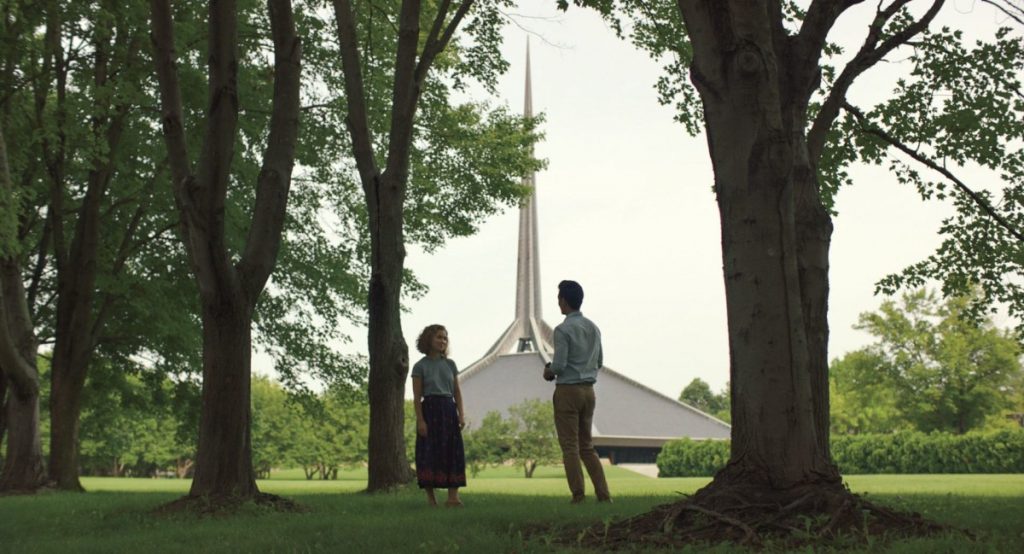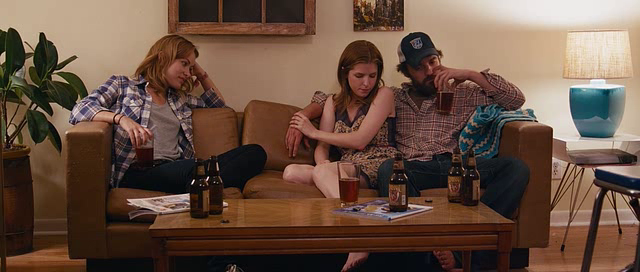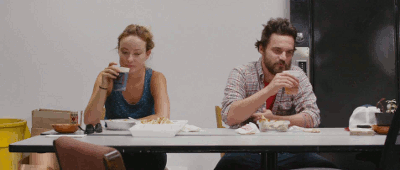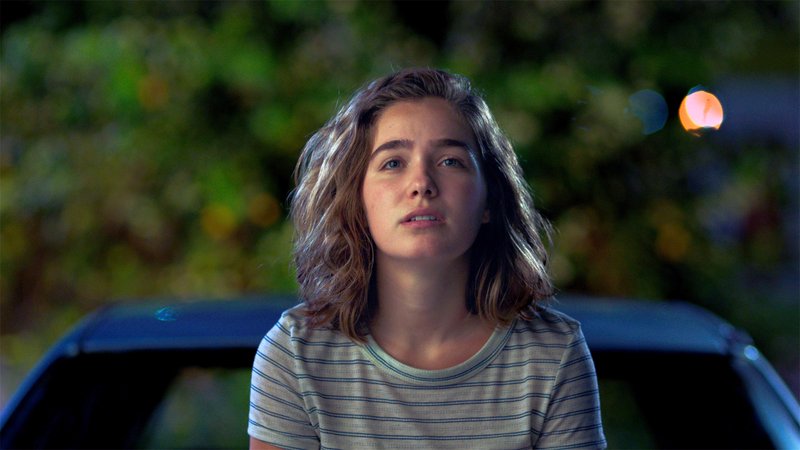Alex writes about Drinking Buddies, Columbus, and more.
Movie afternoon in 2013: Man enters a theatre to watch a film he has head good things about. Man exits theatre happy.
Movie afternoon in 2017: Man enters a theatre to watch a film he has heard good things about. Man exits theatre happy.
Movie night in 2018: Man watches two films he adores at home. Existential crises ensue.
There are many things that have changed in my life over the past four to five years. I eat a lot fewer chicken fingers, I smoke either more or less weed (but not the same amount), and I no longer fret about making rent. There are many things about life in general that have changed over the past four or five years. The iPod Classic is no longer produced, we either care more or less about Elon Musk (but not the same amount), and in general nothing about civilized society makes sense. So it goes.
Unsurprisingly, given the way I like to spend my time, I think about going to the movies a lot. Equally unsurprisingly, given my obsession with thinking about going to the movies, I think about my differing reactions to the experience a lot as well. Sometimes, I watch movies again to see if the same reactions exist from previous screenings, or if they have been lost to time, a fleeting emotional reaction that could only happen once and then never again.
Two nights ago, after a holiday weekend Sunday filled with more video editing than anybody wants, I decided to watch a couple of films. Relatively quickly, that decision morphed into, “I want to watch a couple of my favourite films from this decade.” I chose Columbus, a film from 2017 that has remained relatively difficult to get out of my head, and Drinking Buddies, a film from 2013 that I once talked about constantly to all who would listen (and many who wouldn’t but nevertheless nodded politely).
Columbus is the film in this pairing you know less about, because very few people seem to know about this film. It is written and directed by the mononymic Kogonada, a person who gained a small amount of internet fame for making artful* video essays about the aesthetic tendencies of various filmmakers. This turned into making a couple of pieces for the Criterion Collection and the British Film Institute, which then turned into making his debut feature Columbus. The origin story is as charming as it is encouraging.
*Many of these essays have no traditional narration. The ones that do have voiceover narration are often written in a thoughtfully obtuse manner.
There’s an easily translatable description of Columbus for the non-viewer, and that description is as follows: Columbus is kind of like Lost in Translation, if Lost in Translation was a little less funny and much less racist. Jin (John Cho) returns to Columbus, Indiana to care for his ailing father, and while there meets Casey (Haley Lu Richardson) as she struggles to figure out whether to pursue an interest in architecture or stay in Columbus to care for her mother. The film is not exactly action-packed, but the amount of care put into each frame is gigantic and inspiring. Surrounded by a plethora of modernist architecture, Kogonada’s approach seems to be to set the camera up and just let us stare at the relative simplicity of the story and the gorgeousness of the setting. At one point in the film, Casey describes how those who grew up miss the beauty that’s around them, and that’s basically the point. Kogonada focuses the camera on the same element for long enough that you have no choice but to embrace it.
Smoking is another motif in the film, a motif that ties our leads together. When Casey and Jin meet, they meet over the sharing of a cigarette, and they continue to smoke together throughout the film. The pair discuss all the troubling aspects of their lives, their respective relationships with the parental figures they are in Columbus for, and they both feel suffocated so they exacerbate said suffocation by filling their lungs with smoke. On their last day together, after Casey has decided to leave Columbus to pursue her own life, she and Jin swap out the cigarettes for pastries. They are still partaking in unhealthy activities together, because one always does, but at least they’re no longer suffocating themselves with a cloud of smoke. (At least the pastries have some high-in-fiber strawberries worked in.) They choose to let themselves breathe together and part ways.
Casey has one last cigarette with her coworker Gabe, though. She sits on the steps of their shared workplace, talking to Gabe for (potentially) the last time. Casey offers him a cigarette like she has so many times before, and Gabe tells her he doesn’t actually smoke. He only did so as a reason to hang out with her. While hanging with Casey, one has to engage in an activity that slowly kills you, as her suffocation spreads to those around her. As such, she must leave Columbus if only to decrease respiratory ailments in those close to her.
SIDE NOTE: Early in the film, Casey watches a kid playing next door to her home. In the final moments of the film, after Casey has left town, there are a variety of shots to places we have seen from earlier in the film. Cut to the same place that kid used to be, albeit now sans child, signifying that Casey has left her childhood behind. Koganada is sharp.
When I first saw Columbus a year ago, I knew I enjoyed it. Patient cinematography and intricate sound design is kind of my jam. The movie didn’t infect me necessarily, but it stuck with me enough to see it again, and to assume I would watch it again sometime after that second viewing.
Drinking Buddies, on the other hand, held an immediate and visceral reaction. I saw it one afternoon, loved it, then went to work at an international film festival and couldn’t stop thinking about the film I had seen screened at a theatre far removed from said festival. Since Drinking Buddies was released in 2013 – in the midst of that brief period when indies did day and date releases in select theatres and on video on demand – I decided to have a couple beers and watch it again when I got home. It was still fantastic. The actual reaction to my first viewing has been lost to time*, but I obviously loved the film. Drinking Buddies has become so intertwined with how I think about my own life that I have few specific memories about seeing it. I think about it so much that specific situations of my own existence are erased by the perfection of the movie itself. To detail exactly what about Drinking Buddies works for any particular viewer is to give too much away about one’s own mind state, and as such I will not do so. Instead, I will only detail the final scene, a perfect single shot that encapsulates everything about friendship and potentially failed romance and the acceptance of various rules of human existence.
*For some reason I remember my third viewing, the second time I saw it in cinema, in great detail, but hardly remember the first and second viewing.
In short, for those who need a refresher: Kate (that’s the one played by the tertiary character from The OC) and Luke (that’s the one played by the guy from New Girl) are buds. Kate and Luke might have a shared attraction. Luke lives with Jill (the one from Pitch Perfect). Jill goes on vacation with her girlfriends. Kate has to move. Luke helps. Luke injures himself, which spurs on an argument. Kate and Luke may or may not be able to happily co-exist with each other, but know they will see each other again at the workplace tomorrow regardless. Tomorrow comes, as is its wont.
The final scene of Drinking Buddies is a single shot of Kate sitting by herself in the lunchroom at work, when Luke comes in and sits next to her, handing her a stout as per her preference. The pair sit in silence, Kate gives Luke some fries, Luke gives Kate a banana, Kate rejects it and Luke throws out the potent source of potassium as they chuckle and sip their beers. They silently accept what they have gone through together, and accept that they will never talk about it. It’s something that happened, but it can’t be a Thing that happened. Then the film cuts to black as they sip their beers, because this is what they do together and this is what they shall continue to do.
In Columbus, characters come to certain realizations about themselves and one lead remains physically stagnant while emotionally in motion. In Drinking Buddies, the same thing occurs with Kate and Luke. They sit next to each other and finish their argument without words, because it’s the better way.
There’s no way to know which of these films I truly appreciate more. The obvious answer is Drinking Buddies, simply because I think about it more and it revealed itself to me a lot quicker than Columbus. If given the choice to recommend one of these films to the average person, I would choose Drinking Buddies. It’s much safer; Columbus requires a pre-amble about pacing. The process of watching each film was incredibly similar, but the process of reacting to each film was much different. That doesn’t make Drinking Buddies necessarily the better film – more than anything, it means I first saw Columbus when I was thirty-one as opposed to twenty-seven. The possibility of watching a movie in the afternoon, going to work, and then coming home to drink a couple of Carlsbergs while watching that same Joe Swanberg film again simply does not exist any more. It could – this is not a difficult physical task that my left knee can no longer handle – but you get what I mean. Time passes, things change, and even when you can’t technically feel it, you can feel it.
When I watched Drinking Buddies this week for the first time in a few years, my reactions to a variety of situations portrayed within had changed. Different conversations with different characters made me cringe (although the same cringes from the same characters also still existed from previous viewings). The same moments felt unpleasant, the same things made me unhappy. I saw my own life reflected, merely the shape of the mirror had changed to accompany the new shape of my mind. I stand more resolute in the belief that it is a great film.
Columbus hasn’t been in the world long enough for my opinion to shift on it. I have watched it three times in the span of the past 365 days, though, and have only become more confident that it is very good. The patience of the film demands a certain awareness of what we need to fill the gaps in story – the sound design is impeccable, the cinematography gorgeous – and this command over the visual form leads me to believe in Kogonada’s abilities as a writer. What seems simple is more than that, and I have seen enough evidence to trust my own opinion there.
Outside of the realm of cinema, my opinion is less trusted. I don’t even know what to think about what topics to care about anymore. Do I care that Steve Bannon was a headliner of the New Yorker Festival and then just as swiftly not? Do I care about Colin Kaepernick being paid by Nike? Do I care about people realizing Haley Lu Richardson is a really talented actor? (Maybe, maybe, yes.)
I have a pervasive thought that, five years from now, I’ll look back on what I wrote during this period of time and become confused and depressed. For one, almost everything I have written in the past year-plus is astoundingly similar. The topics are technically different, but the ideas aren’t. At the core of each essay is something I don’t understand, which I recognize is the core of anything a person chooses to write with no financial incentive to do so. But there are things I wrote less than a year ago that I have full on forgotten piecing together. I don’t know why I needed to write an essay about Blade Runner 2049 when James and I had already done a podcast about it, and yet it is there for the reading. Of the past year and a half I only really remember writing Big Fish Theory, which is something wide-ranging about the way various pieces of media were received in June-July 2017. I wrote about Detroit for some reason; I wrote about Brad’s Status and Battle of the Sexes even though I disliked both. These pieces really feel like something instead of nothing, writing only to keep the motors in my brain turning.
Five years from now, how am I going to feel about the essay I’m currently writing? (Unknown.) Am I still going to be writing this stuff? (Unlikely.) Am I still going to be writing anything? (Likely.) Will those pieces feature rhetorical questions that are then answered in parentheses? (Almost certainly yes.) Or will I just be more adjusted to the life lived on autopilot that comes with being in your thirties?
For the past week-plus, I have been putting in time working a contract that I have done each of the past eight Septembers for the Toronto International Film Festival. The same is true each year: I see movies, I end up in the background of celebrity Instagram accounts, and I have the same brief conversations with many different people I never see outside of the first half of September. For years, I have found this process fun, mostly because being paid to watch movies is all I want out of life, but also because it is challenging work. And for years I have been obsessed with the same question: by the end of the festival, I always find myself talking to people about the compression and expansion of time. Somehow, after ten days of doing the same thing all day every day without your recommended dose of sleep, time feels different than it does for the rest of your life. We all collectively feel like the festival started yesterday, and we all collectively feel like yesterday was February. It is somehow endless and over in a flash. At some point you realize how much time has actually passed, and how that time has changed your thoughts on various elements of your existence.
One recent change in how I appreciate films has been a growing interest in the appreciation of how films use music to convey an aspect of the story. On our recent Tully podcast, I spoke about how impressed I was that Jason Reitman and company chose a song for their ending that was a perfect encapsulation of a song their main character – a sharp, thoughtful, formerly cool mom – would actually listen to at her age. The song is In a Black Out by Hamilton Leithauser and Rostam, the lead singer of The Walkmen and the producer for Vampire Weekend respectively, two bands somebody like Marlo was likely a fan of as a younger woman and therefore continues following throughout their careers. The film uses an instrumental version so as to not intrude too much on the beautiful moments it underscores, but searching out the vocal version informed me the music selection was even more perfect than I initially thought. The song beautifully describes the interior journey Marlo goes through as she ages, building a smaller life and leaving your youth behind, and that I had to track down the vocal version of the song only makes that decision hit harder as I’m walking home from work at 2am. Using the instrumental version in the film only underscores this: in a film about characters not trying hard enough to understand what is going on in Marlo’s head, you need to do a little bit of extra work to hear the words that are flying in through her earbuds.
Rewatching Drinking Buddies in 2018 – not long after being mildly obsessed with Tully – comes with the baggage of being extra interested in musical choices, and with this viewing the song in the final scene grabbed my interest. As with pretty much every choice in Drinking Buddies, it feels like something that could be in a normal romantic comedy, but just slightly askew enough to make it an interesting decision. The song, The End of That by Plants and Animals, is an upbeat song that accentuates the film’s cut to black, helping rise the audience out of their seat and to the bathroom. If one listens to the lyrics, though – which admittedly, I never did, but mostly because I find the wordless final scene too fucking intense to then immediately deal with the oppression of the English language – it’s a song about temptation. The End of That is about trying something, maybe trying it again, and then removing yourself from the picture because you know you’re better off this way. It puts an optimistic bow on Kate and Luke’s friendship – the song suggests there will be no secondary confusion between the two should Jill go on another vacation while Kate needs help moving. And this thought process happens within the characters’ heads, the film leaving it to us to (eventually) listen to the lyrics and decipher. Eventually, at some point, you realize parts of your life end.
There was initially a third film planned for my movie night, another movie I have seen way too many times and adored every time. Hot Rod, a 2007 film starring Andy Samberg is unequivocally silly and unequivocally perfect. After two trips to a past of different distances though, the less threatening Samberg-based time jump to Brooklyn Nine Nine seemed more appealing than remembering what my life was like eleven years ago. At some point, a film becomes far enough removed from you that watching it can feel like an accidental time jump through your own existence, even when that film is structured around an SNL goofball jumping fifteen school buses on a bike. Once something is old enough, it stops being consumed in one way and instead becomes another. It may be idiotic to feel this way talking about an Andy Samberg movie, but that doesn’t make the thought any less correct*.
*Full disclosure: Two weeks after writing this paragraph, I ended up watching Hot Rod, because whiskey is a potent time machine.
One of Kogonada’s finest visual essays on film was about Richard Linklater, with a specific focus on the Before trilogy. Intercutting pieces of dialogue from three films spanning eighteen years, conversations begin in 1995 and are continued in 2013, but it’s clear that the people remain the same. Opinions change, people change, but they also don’t.
“It’s a big element of our medium, isn’t it? The manipulation of time, the perception of time, the control of time. Kind of the building blocks of cinema. Time is a really powerful factor, but it is in all of our lives, you know?” This is Richard Linklater speaking in a phone interview with Kogonada, played over clips of various films before shifting to a focus on the Before series. “Jesse and Celine are constructs, they’re not Ethan and Julie, they’re not me, they’re these written parallel worlds saying something about (…) what it’s like to be a person. How you physically change, how you mentally change, you know, how you’re still the same person but kind of not.”
Is quoting Richard Linklater talking about time hacky? Yes. I have done it before. Everybody does it, and nobody will ever do so as artfully as Kogonada does here. But I will almost certainly try it again, because this is who I am.
The situations presented will change with time, as perspectives change. You look at one thing one way, then much later you look at it again. More often than not, you will continue to be obsessed with that which already obsessed you. Sometimes that’s an Andy Samberg movie, and sometimes you let it go and replace it with a Joe Swanberg movie for reasons unrelated to the phonetic similarities of their surnames. And that’s the end of that. Until enough time passes and you let that go, of course.







